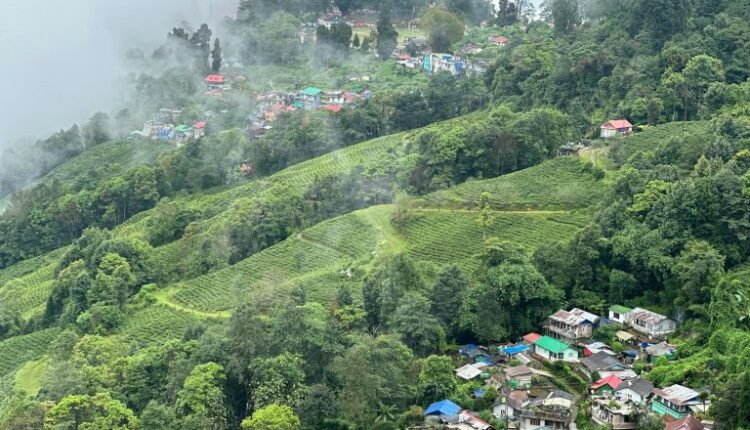Climate Change May Shift Darjeeling From Iconic Tea Region To Coffee – CoffeeTalk
Darjeeling’s iconic tea industry is facing climate unpredictability as over 500 acres of land in Darjeeling and Kalimpong districts are under coffee plantation. The transition from tea to coffee has helped farmers like Arjun Rai, who planted Arabica coffee on half-an-acre of fallow land in 2018-19. Last year, he produced around 100 kg of cherries, selling them to private buyers at an average price of Rs 50 per kg.
The coffee plant takes three years for a coffee plant to bear cherries and six years to fully mature, with around 4.5 to 5 kg of cherries being harvested annually from each matured plant. The West Bengal government is excited by the steady growth of coffee cultivation in the hills and is drawing up a strategy to create more demand for the coffees from the state. The panchayats and rural development department has been shortlisting farmers for advanced training.
Many farmers who were into ginger and black cardamom cultivation are now diversifying into coffee hoping to get better returns than spices vulnerable to viral diseases. The Gorkhaland Territorial Administration (GTA), a semi-autonomous council that governs the two hill districts of Darjeeling and Kalimpong, is planning further expansion of the coffee plantation area. The Directorate of Cinchona and Other Medicinal Plants (COMP) has been made the nodal agency for the ambitious plan to grow coffee in the land of tea.
The genesis of the coffee plantation is that the extreme cold and frosty climate of the hills was not suitable for the coffee plantation. The ideal temperature range for the plantation of Arabica variants of the coffee that grows in higher elevation is between 18°C and 23°C, which requires an annual rainfall of 160 to 250 centimeters. A recent report of an intergovernmental panel for climate change projected that the average annual temperature in Darjeeling will go up by 5.4 degrees Celsius by 2100, with about 90% of the rise occurring from 2015 onwards.
Coffee plantations in West Bengal began as a pilot project in 2014, with the first harvest of robusta coffee beans in 2017. The coffee plantation was successful, with around 500 kgs of ripened cherries harvested in 2017 and one tonne the following year. The GTA secretary C Murugan sent a team to Coorg, Karnataka, to study the feasibility of coffee plantation in the hilly terrains of Darjeeling. After receiving a positive report, the COMP selected around 500 farmers to start the plantation by distributing saplings. Around 7.20 lakh saplings were distributed among the farmers after giving them training from the Coffee Board in 2018.
Farmers are privately planting on around 345 acres of land, with around 1,000 farmers engaged in the work. In addition to farmers, the COMP is also doing its own plantation on around 194 acres of land. The current yield is around six to seven tonnes of raw cherries or 2.5 to 3 tonnes of end-product. Around 95% of the produce is of the Arabica variant, which is more aromatic than Robusta coffee.
The directorate has recently set up a small processing unit, taking another baby step towards full-fledged commercialisation of coffee in the hills. While coffee is slowly digging its roots in the hills of West Bengal, tea is facing an existential challenge. The production of the famed muscatel-flavoured tea has seen a steep decline in recent years, plunging to a historic low of just 5.6 million kilograms in 2024, the lowest in its 169-year legacy. Factors contributing to this decline include erratic weather patterns, changing rainfall cycles, and policy lacunae.
To combat the impact, the Tea Board has suggested measures like planting drought-tolerant cultivars, retaining adequate number of shade trees, creating proper drainage systems, rain water harvesting for better water management, and bringing changes in pest management. The board has recently come out with a Plant Protection Code (PPC) to ensure responsible use of pesticides to minimize chemical reliance and maximize sustainable pest management practices through non-chemical approaches. However, the banning of the chemical pesticide has become counterproductive in many gardens as non-chemical approaches are failing to effectively control pests, leading to crop damage.
Trade union leader and CPI(M) central committee member Saman Pathak said policy lapses on the part of tea-garden management are also aggravating the problem. Workers in about 15 of the Darjeeling hills’ 70 functional gardens boycotted plucking the premier first flush leaves this year over a pending bonus issue, which will have serious implications on production. Capital changes from production to job creation are another factor responsible for the dip in production, as most of the gardens are leasing out their land for tourism activities, adversely impacting their core business of tea production.
Read More @ The Federal
Source: Coffee Talk



